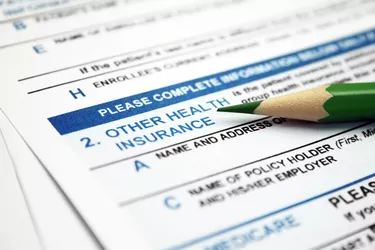An employer health plan provides medical insurance to employees, and often their dependents and spouses as well. Depending on the employer, the plan may include dental coverage. Health insurance deductions can either taken be pre-tax or post-tax. The employer makes the payroll deduction according to the deduction category.

Video of the Day
Pre-tax vs. Post-tax
A pre-tax health insurance plan is one that meets the standards of IRS Section 125 code. To comply with the code, employers must establish a plan document, distribute a summary plan description to all participants and meet ongoing compliance regulations. A pre-tax health insurance plan, also called a "cafeteria plan," allows the employee to opt to pay his share of the benefit cost in pre-tax (before tax) dollars. A health insurance plan that does not qualify as pre-tax under IRS Section 125 code is automatically a post-tax deduction. For example, a health insurance plan in which the employer pays the entire cost is not pre-tax because it does not allow the employee to contribute monies that can be used as pre-tax dollars.
Video of the Day
Calculating Benefits
The employer deducts the pretax health insurance benefit from the employee's gross income — her total pay before deductions. It deducts post-tax benefits after deducting the pre-tax benefit, federal income tax, Social Security tax, Medicare tax, state income tax and wage garnishment (if applicable) from the employee's pay. The deduction amount depends on the provider rates, the employer's contribution and the employee's pay period. For example, a weekly employee's health insurance premium depends on one week's pay; a biweekly employee's premium depends on two weeks' pay.
Pre-Tax Effect
Pre-tax health insurance deductions lower the employee's taxable wages because the benefit is deducted from gross wages, or before tax withholding. This process is referred to as giving the employee a tax break. A reduction in taxable income means that the employee pays less in taxes than if the benefit were deducted on a post-tax basis. A cafeteria plan is the only way an employer can offer employees a health insurance plan that allows them this tax break.
Post-Tax Effect
Post-tax health insurance deductions do not reduce taxable income, because the benefit is deducted from wages after pre-tax deductions and payroll taxes are deducted. The employee does not receive a tax break in this situation; his entire gross income is also his taxable income.
A Few Considerations
In box 1 of the employee's W-2, the employee states her taxable wages, which includes her annual taxable (post-tax) health insurance deductions. Box 1 does not include pre-tax deductions, because the deduction is not subject to taxation. Unlike statutory deductions, the employee can stop her health insurance deductions at some point. The employee must generally wait until open enrollment to stop the deduction, unless a qualifying event, such as a change in marital status, applies.